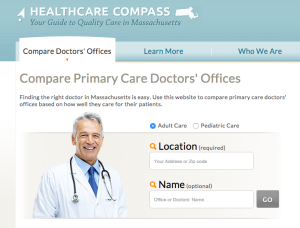
Massachusetts Health Quality Partners is a national leader in reporting on patient experience in primary care. Its latest data release at healthcarecompass.org provides valuable information for patients looking for a physician and for practices seeking to understand how they perform in absolute terms and in comparison with others.
You may be familiar with the adage, “What gets measured gets done,” so it really is important what we decide to measure and to publicize. Some patient experience topics, like communication, have been measured and reported for some time. The average score is now 93.5 out of 100 –which is great, but it also means that it’s hard to improve from there and that communication may not be a great way to choose between practices.
By contrast, some of the newer categories demonstrate opportunities for –and evidence of– improvement. This is just the second year asking about behavioral health screening –an important topic since so many behavioral issues first present in primary care. Scores on that measure have risen from 53.1 to 56.5 from 2014 to 2015, while some practices have shown improvements of up to 20 points.
Self-management, a new topic this year, comes in with a score of 54.0 for adult practices and 43.6 for pediatrics. Look for that one to rise in the coming years as well. Statewide results are summarized on the MHQP website.
Most of the scores are reported as Harvey balls, with four levels of differentiation. It’s easy to compare practices against one another on specific measures, but on the other hand it’s difficult to figure out how any given practice rates overall. That’s partly because unlike commercial rating sites, MHQP is a collaborative that needs to keep the providers on board.
A shorthand way to make comparisons is with the “willingness to recommend” score that’s reported as a percentage. I asked MHQP spokesman Joe Ternullo about this measure and how to use it:
How can patients use this measure to chose a physician?
People often ask others for a recommendation when choosing a new doctor. To learn more about this, MHQP asked patients: “Would you recommend this provider to your family and friends?” MHQP suggests that patients look at all available information before choosing a new doctor. This is because no single rating by itself can give a clear picture about a healthcare provider’s quality of care.
Can a consumer use that measure to make a decision when the information is presented at a practice level?
Yes. A consumer should use the ratings at healthcarecompassma.org to see how his/her primary care practice fares, or to look for practices in their region that have scored particularly well. In either case, focus on two things. First, look at the percentage of patients who said they would recommend the doctor. Don’t focus too much on minor differences, such as between practices with scores from, say, 86 to 89. Second, look at its scores for individual aspects of performance, such as communicating with patients, coordinating care, and getting timely appointments. These measures are a guide to help patients assess certain aspects of patient care. No single measure reveals everything about the quality of care at a provider’s office. Different practices may excel in different areas. But a low score can point out certain aspects of care that a doctor’s office needs to improve.
And as a follow-on, how do practices use that information with their own providers?
Medical care is complex, and patient experience is only one measure of quality. For example, it is important to know how well as doctor helps patients manage conditions like arthritis, diabetes, high blood pressure or high cholesterol. But patient experiences can affect those clinical measures. Many practices have used the MHQP statewide patient experience survey results to improve how they interact with their patients.
The MHQP patient experience survey is a valuable community resource that we are fortunate to have in Massachusetts. The survey is supported by leading health plans and provider organizations.
—
By healthcare business consultant David E. Williams, president of Health Business Group.
from Health Business Blog http://healthbusinessblog.com/2016/02/02/mass-health-quality-partners-releases-patient-experience-results/
via A Health Business Blog
No comments:
Post a Comment